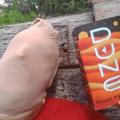Jordi reviewed Cosmos by Carl Sagan
A personal voyage thru the universe
5 stars
This book and the series amazes and brings this child-like curiosity to know how things work, where we came from, and what's our tune in this majestic symphony that is life and the universe.
I deeply love it.
This book and the series amazes and brings this child-like curiosity to know how things work, where we came from, and what's our tune in this majestic symphony that is life and the universe.
I deeply love it.











